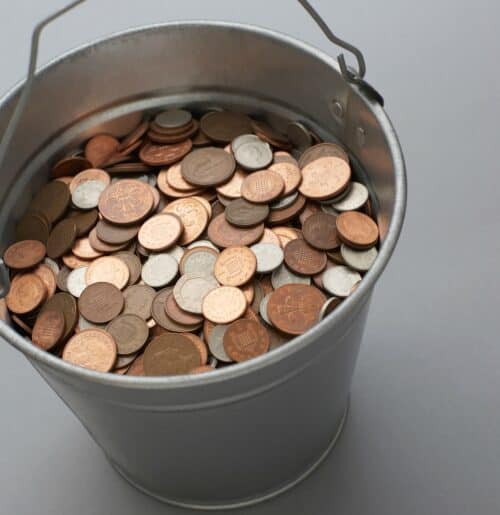Here are the 5 best ways to build a financial safety net that we have implemented over the years!
This article contains affiliate links which means that if you click through a link and make a purchase I may receive a commission for the introduction.
Building a financial safety net is crucial to long term happiness. Living paycheck to paycheck causes SO much stress!
Hopefully some of these money saving tips are useful! Remember that saving money is just one way to build a safety net. Making extra money is also very important. Check out some of there articles for some awesome ideas on making more money.
$50 an hour proof reading online
10 side hustles that will help you
Ultimate Guide to Side Hustles
LEARN HOW TO WIN 90% OF YOU TRADES IN 90 SECONDS!
>>CLICK HERE TO LEARN MORE! <<
Bullseye Trades: Best Alerts Service
Every Monday at the market open, Jeff sends you his weekly Bullseye Trade.
2022 has been AMAZING for these Bullseye Trades!
(+50% to 300% per week in my experience)
SIDENOTE! INVESTING DIVA!
LEARN HOW TO WIN 90% OF YOU TRADES IN 90 SECONDS!
>>CLICK HERE TO LEARN MORE! <<
Bullseye Trades: Best Alerts Service
Every Monday at the market open, Jeff sends you his weekly Bullseye Trade.
2022 has been AMAZING for these Bullseye Trades!
(+50% to 300% per week in my experience)
1. Why You Need To Keep A Household Budget
We work hard to earn a living. We should make sure we spend the money we bring home wisely.
That’s where a household budget comes in.
It’s a good tool to see at a glance what we have coming in, what’s going out (and what that money is paying for) and if there’s anything left at the end of the month to put into savings.
Before we dive into exactly what a budget can do for us, let’s consider for a minute what will happen if we’re not tracking income and expenses. We may end up spending more than we’re making in a given month (or two, or three).
Over time that can put us into some pretty hot water financially. We may also spend a lot more than we’d like to believe on things like eating out, going to the movies or new clothes.
Having a budget gives us more control over where we want to really spend our hard earned cash. Maybe that’s dinner and a movie, but maybe it isn’t. Wouldn’t it be nice to have an actual choice?

It Tracks Where Your Money Is Going
A budget simply tracks your money. You record where the money comes from each month (your income) and then write out everything you spend it on, starting with your regular monthly bills like mortgage or rent, car payments, utility bills etc. What’s left after all the bills are paid is your discretional income.
Helps You Identify Things You Waste Money On
Having it all in front of you in black and white helps you identify things you’re wasting your money on.
It makes you reconsider if you really want to spend well over $200 a month on Cable TV or $150 on your large cell phone plan. Or how about that yearly magazine subscription to something you no longer read? Go through your expenses and reevaluate if this is REALLY how you want to spend your pay check.
Allows You To Be Proactive About Savings
Saving money without a budget is hard. We go in with the best of intentions at the beginning of the month, but somehow there isn’t anything left at the end of the month.
A budget gives you a chance to be a bit more proactive. Set aside some money for savings at the beginning of the month, even if it’s just $20. Put it in the budget as a regular expense, just like you do with your other urgent bills. If you need to, open a separate savings account so you’re not tempted to spend it.
Ensures You’re Not Spending More Than You’re Making
Most importantly, your budget will keep you on track and help you make sure you’re not spending more than you’re making. And I don’t have to tell you that that’s pretty important for your financial wellbeing.
2. Put Your Savings On Autopilot
Putting a little money away for a rainy day isn’t always easy. You may have some good intentions, but at the end of the day, there just isn’t any money left. Somehow whatever you make is spend before you make it to the next paycheck.
Start by making a personal budget. Take a look at what you bring in each month. Next, write down your fixed expenses. These are things like rent, car payments, utilities etc. Figure out how much you need each month for groceries and other essentials. This is your bare bones budget. It’s good to know what you need to get by each month.
Next it’s time for a little bit of math. Start with what you bring in each month and subtract all your core expenses. What you’re left with is your discretional income. This will pay for entertainment, clothes, getting your nails done etc. And from here on out, part of that discretional income will go into a savings account.
Pick a number you’re comfortable with. Maybe that’s just $20 per month, maybe it’s $500. Put it in your budget and treat it like any other bill. It won’t take you long to get into the habit of setting aside that money for savings.
To make it even more hands-off, talk to your bank about setting up a separate savings account. Then set up an auto-deposit to have the savings transferred to the new account as soon as your pay check comes in each month. If you don’t see it, you’ll never miss it and your savings will run on autopilot.
Don’t forget to audit your savings from time to time. Take another look at your budget.
Can you increase your savings a little more? Another great way to boost that savings account is to take any extra money – thinks like birthday cash, tax return, bonuses etc. – and put them straight into the savings account. Again, you won’t even miss the money, but it will help you build up your savings quickly.
LEARN HOW TO WIN 90% OF YOU TRADES IN 90 SECONDS!
>>CLICK HERE TO LEARN MORE! <<
Bullseye Trades: Best Alerts Service
Every Monday at the market open, Jeff sends you his weekly Bullseye Trade.
2022 has been AMAZING for these Bullseye Trades!
(+50% to 300% per week in my experience)
Make sure your savings are sitting in an interest bearing account. Since you won’t be touching this money unless it’s a dire emergency, you should be able to earn at least a little interest. Talk to your banker about your best options and start putting your savings on autopilot.
One last tip: Talk to your employer about matching 401K funds. You may be able to get a contribution from the company you work for towards your retirement savings account.
3. How To Plan For Unexpected Expenses
It’s just a matter of time before it happens. The transmission blows on your car right around the time your daughter needs braces and your washing machine decides to call it quits. All of these are unexpected expenses and something we need to deal with throughout life.
Being prepared as much as you can is your best bet when live throws you a financial curve ball.
Do your best to anticipate upcoming expenses. If you’re driving an older car, or your dishwasher has seen its better days, start saving up to replace the item. You may also want to start keeping an eye out for good deals on the replacement.
An even better strategy is to have an emergency savings fund. Set up a savings account and add to it monthly. Use it only for completely unexpected expenses. Make sure you know what’s in the account. And once you have to take money out of it replace it as quickly as possible.
This brings us to a good point. Here’s how to recover quickly after that purchase. Go over your budget (you have one of those, right?) and look if you can temporarily cut back on some things.
Stop ordering Pizza every Friday night and make your own at home. Skip a night out on the town and watch a couple of movies on Netflix instead of going to the theatre.
Use the money you’re not spending for the next few months to refill your emergency fund. For an extra boost, work a few hours of overtime, do a few freelance projects or temporarily pick up a part time job to get back on track fast.
But what do you do when the expense comes up before you had a chance to set up the emergency fund?
Take a deep breath and assess the situation. Can you make do without the item for a little while? Just long enough to scrape together the funds to repair or replace it. If it’s the dishwasher, that’s easy. You can wash dishes by hand for a little while. If it’s the fridge or the car you rely on to get you to work each day, that’s a different story.
If you need the item that broke, evaluate if it would be less expensive to repair than replace.
Even if it isn’t the perfect solution, it may get you to work until you can safe up for a different car. Shuffle your money around and if there is no other option charge it to the credit card and get to work.
Your one and only goal right now is to pay off that expense. If you stick every penny of discretional income in, it won’t take you long.
One your bills and credit cards are paid off, do what you can to get that emergency fund set up. Because you know something else will break down the road.

4. Keep Your Grocery Spending Under Control
Aside from your mortgage, your biggest monthly expense is likely groceries. And unlike your mortgage, your car payment and most of the rest of your bills you actually have some control over how much you spend at the grocery store.
Make A Grocery Budget
Start by tracking how much you’re spending on groceries for a few weeks. From there, come up with a weekly or monthly budget. Allot that money for groceries and whatever you do don’t go over.
Next, try cutting back your budget by $20 per month. Keep going and see how low you can go. The remaining tips will help you do that without feeling like you’re depriving yourself.

Keep A Price Book
Who doesn’t love a bargain or a good deal? They are all over the store, but do you know if what they advertise as a good deal is actually saving you money?
Keep a little notebook in your purse or keep a text document on your phone with the regular prices of the items you buy most often. Not only can you see if that “deal” really is a deal, you can also determine what kitchen staple is cheapest where and adjust your shopping accordingly. Your price book will also come in handy when you browse through weekly grocery flyers. You can decide if a loss leader deal is worth driving to the store long before you ever set a foot out the door.
LEARN HOW TO WIN 90% OF YOU TRADES IN 90 SECONDS!
>>CLICK HERE TO LEARN MORE! <<
Bullseye Trades: Best Alerts Service
Every Monday at the market open, Jeff sends you his weekly Bullseye Trade.
2022 has been AMAZING for these Bullseye Trades!
(+50% to 300% per week in my experience)
Come Up With A Few Frugal Dishes
You don’t have to make drastic changes and eat nothing but rice and beans all week. Instead think of a few inexpensive dishes your family enjoys. They may be rice and beans. Or how about a big pot of soup or chili. Often meatless dishes will be your best frugal bet, or use meat in small portions on frugal dish days.
Enjoying frugal meals even just a handful of days during the month combined with using up any and all leftovers will make a big difference in your grocery budget.
How to Eat Healthy on A Budget
Cut Out The Extras
Make a list before you head to the store and stick to it. All those little extras like the fancy bread from the bakery or the candy you grabbed at checkout start to add up. Get in the habit of skipping those extras unless there’s a good reason to buy them. Stick to your list and you’ll cut your grocery bill by quite a bit each week. It’s amazing how all those little extras add up.
Give these tips a try and see if you don’t start to see big savings on a weekly basis. What you do with all the extra money each month is up to you. Save up for a fun summer vacation, pay off those credit cards or start building your financial safety net.
LEARN HOW TO WIN 90% OF YOU TRADES IN 90 SECONDS!
>>CLICK HERE TO LEARN MORE! <<
Bullseye Trades: Best Alerts Service
Every Monday at the market open, Jeff sends you his weekly Bullseye Trade.
2022 has been AMAZING for these Bullseye Trades!
(+50% to 300% per week in my experience)
Conclusions: Do You Have A Financial Safety Net?
Do you have a financial safety net? It’s something worth thinking about and setting up.
What will happen to you and your loved ones if you lose your job for a few months? What if you get into an accident that may prevent you from earning a living? Or what if some unexpected expenses come up.
Do you have anything in place to make sure the bills continue to get paid and your family is taken care of? Make sure you have sources of passive income set up!
If not, now is the time to get started. But where do you actually start?
Having three to six months’ worth of living expenses tucked away in an interests-bearing account is a good beginning. Figure out what your family needs to comfortably live on if all income stops. Then start saving as much money as you can until you have built up this safety net.
Put the money you usually spend on going out to eat, going to the movies, buying the newest TV and Tech gadget and the likes into your savings account until you’ve saved enough to have a comfortable cushion. Take make this step go even faster, add any bonuses, tax refunds etc. as well.
Don’t just stop there. Make it a goal to add to your safety cushion as you can and come back and revise your numbers from time to time. Your living expenses may go up or down over time and you can adjust how much you need to set aside in quickly accessible money accordingly.
Life and disability insurance are another important part of your financial safety net, as is your retirement money.
Do you have a plan in place to continue to cover your living expenses (or those of your family) when you can no longer work? Call up your insurance agent and go over your current coverage.
Make sure the insurance you’re paying for will pay out what you need and if not, make adjustments.
Once you have those two parts of your safety net firmly in place, consider investing any additional savings into higher interest bearing accounts.
While you may not be able to access any money invested here right away, it will come in handy when you’re dealing with a long term financial emergency or are ready to retire.
The plus side is that there are plenty of investment vehicles out there that will get you a much better return than your plain savings account at the bank. Talk to your financial adviser and come up with a plan that’s right for you, your family and whatever the future may hold.
LEARN HOW TO WIN 90% OF YOU TRADES IN 90 SECONDS!
>>CLICK HERE TO LEARN MORE! <<
Bullseye Trades: Best Alerts Service
Every Monday at the market open, Jeff sends you his weekly Bullseye Trade.
2022 has been AMAZING for these Bullseye Trades!
(+50% to 300% per week in my experience)


